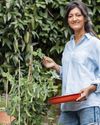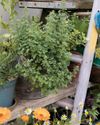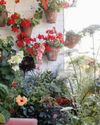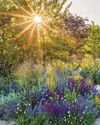September moves summer gently into autumn. The destination into winter may not be where you want to go, but the journey is always a joy. It is a month of calm, tinged with loss, and that gentle sadness simply intensifies the preciousness of the present moment.
Bulb planting begins in earnest in September but continues busily into October with the one exception of tulips, which wait until November and even December for their planting. Increasingly, I grow bulbs in containers, which means that we are accumulating more and more pots, and the one rule of a good pot is that it must be filled with something most of the time. So scillas, muscari, narcissi, hyacinths, irises and fritillaries are planted in gritty compost, along with pans of winter-flowering pansies and violas.
The larger pots see double or even triple service throughout the year, so bulbs are planted shallowly, often in big pans, and then removed after flowering and planted out to die back slowly so the pots can be replanted with a summer display. But as autumn progresses, it is the prospect of these displays of intense bulbs next February and March that sits quietly in these seemingly empty, grit-covered pots.
Early colour
You don't need big, expensive containers to fill your midwinter garden with colour. Small pots, ranging from those roomy enough for a dozen small bulbs to a tiny one holding just a single snowdrop, look great both singly and in groups. I increasingly use terracotta alpine pans for bulbs and keep them in a cold frame, open at the sides but covered on top to protect them from waterlogging. I bring them into the greenhouse in relays to stir them into flower, from the end of January through to mid-March.
Bu hikaye Gardeners World dergisinin September 2022 sayısından alınmıştır.
Start your 7-day Magzter GOLD free trial to access thousands of curated premium stories, and 9,000+ magazines and newspapers.
Already a subscriber ? Giriş Yap
Bu hikaye Gardeners World dergisinin September 2022 sayısından alınmıştır.
Start your 7-day Magzter GOLD free trial to access thousands of curated premium stories, and 9,000+ magazines and newspapers.
Already a subscriber? Giriş Yap

A new plot for tasty crops
Taking on a new allotment needn't be hard work. By simply following a few easy tips you can have bumper crops in no time, just like Alessandro Vitale

We love July
July is an island floating between the joy of June and the slightly fatigued month of August. It's a grown-up month: the year has shrugged off its adolescent exuberances, the weather is (hopefully) warm enough for ice cream to be one of your five a day, the sea should be swimmable without (too much) danger of hypothermia and thoughts will be of holiday shenanigans and family barbecues. School's out this month, the next tranche of glorious summer colour is washing across our borders and it's my birthday. Lots of reasons to give three rousing cheers for July!

YOUR PRUNING MONTH
Now, at the height of summer, Frances Tophill shows how to boost your plants' health and productivity with a timely cut

Hassle-free harvests
Flowers are out in abundance this month and for Jack Wallington, many of these blooms make delicious, low-effort pickings

Bite-sized bounties
Glorious doorstep harvests can easily turn into gluts, so let Rukmini Iyer's recipes help you savour every last bit

Upcycled outdoor living
Create unique and stylish garden features for minimal cost using reclaimed materials and simple DIY skills. Helen Riches shares four step-by-step projects and more inspiring eco tips

Secrets of a COLOURFUL GARDEN
Buildings and landscapes can play a vital role in supercharging your space, as Nick Bailey demonstrates

Greening up a city balcony
Looking for sustainable, small-space gardening ideas? Take inspiration from Oliver Hymans' transformed balcony garden in north-east London - now a lush, green haven for humans and wildlife

The dry and mighty garden
As we adapt our gardens to a more volatile climate, Alan Titchmarsh reveals how to create a drought-tolerant plot and picks his top plant performers

Nature knows best
Carol Klein explains how to choose plants for specific growing conditions, based on what has naturally adapted to thrive there